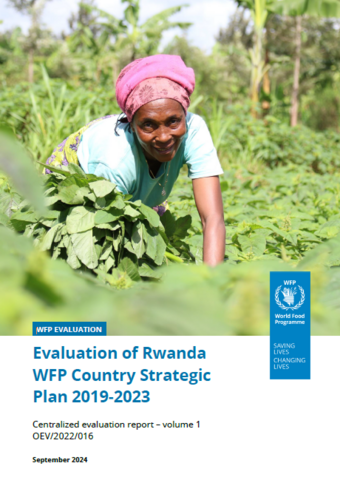
Rwanda, home to 13.7 million people, has achieved positive development outcomes in poverty reduction, gender equality, environmental sustainability, education and public health through economic growth and structural reforms. It remains prone to natural hazards, health-related challenges and food insecurity.
The country strategic plan for 2019–2023 had a strong focus on country capacity strengthening and an explicit commitment to the most vulnerable, in line with the Government’s priorities. It had a clear and integrated programme logic and a focus on collaboration and partnership-supported coherence with other actors, although there were overlaps with other United Nations entities. Recurrent shocks revealed the continued relevance of WFP’s humanitarian role in Rwanda. Overall, WFP's current value proposition – with its focus on saving lives and changing lives and on playing an enhanced role in country capacity strengthening – remains strongly relevant and has appropriately positioned WFP to work across the humanitarian–development nexus.
While WFP provided most refugees and returnees in Rwanda with valuable emergency assistance and was largely effective in reaching the most vulnerable, rations were reduced due to funding limitations and did not fully meet refugee households’ food and nutrition needs. Ambitions regarding refugee self-reliance were also not achieved because livelihood opportunities remained limited. The scale-up of WFP’s school feeding activities to a national programme in 2021 gave all schoolchildren access to adequate and nutritious food; new challenges regarding financing, procurement and sustainability have arisen from this expansion. WFP achieved good results in relation to social safety nets and nutrition-sensitive food systems, including by introducing shock-responsive social protection, supporting national institutions with evidence, strengthening national food processing capacity, supporting the establishment of a child malnutrition surveillance system and generating positive outcomes for smallholder farmers in terms of produce quality, sales and loss reduction. While some opportunities to promote nutrient-rich foods and more efficient supply chain and retail systems were missed, overall, WFP helped to strengthen policy, strategic and accountability frameworks and country capacity and was timely in supporting the Government in managing crises.
In terms of cross-cutting issues, WFP’s gender equality ambitions were only partially met and attention to disability inclusion was limited. Progress was made in beneficiary feedback mechanisms with a majority of beneficiaries covered and evidence that feedback informed programme adjustments. WFP engagement on environmental issues was modest in view of Rwanda’s climate-related challenges; this derived from a difficult funding environment and the heavy earmarking of contributions, which limited the implementation of activities. Funding remains the biggest challenge for WFP in Rwanda.
Backed by enhanced national and multilateral partnerships and government support, WFP benefits from a strong reputation in Rwanda, although the country office’s capacity and internal arrangements could be better suited to the activities called for in the country strategic plan. Even so, when not obstructed by external circumstances, country strategic plan implementation was timely, supported by innovative delivery modalities and effective supply chain and logistics functions. A shift to cash transfers, the use of train-the-trainer approaches and the pursuit of strategic partnerships all contributed to efficiency gains and results. However, monitoring and evaluation systems present weaknesses in capturing certain outcomes and facilitating the effective use of knowledge.
